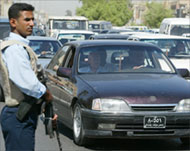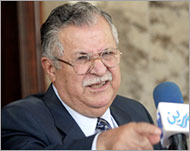Annan: Iraq worst terrorist centre now
UN chief Kofi Annan says Iraq has become what he calls an even greater terrorist centre than Taliban-ruled Afghanistan, as attacks attributed to al-Qaida’s wing surges in Baghdad and the west of the country.

Annan told the BBC on Monday that many young Muslims feel angry and that situation has been exacerbated by what is happening in Iraq.
“They feel victimised in their own society; they feel victimised in the West. And they feel there’s profiling against them,” he said. “And the Iraqi situation has not helped matters.”
Annan added: “One used to be worried about Afghanistan being the centre of terrorist activities. My sense is that Iraq has become a major problem and in fact is worse than Afghanistan.”
The interview with the UN secretary-general was broadcast after al-Qaida in Iraq claimed responsibility for a daring daylight assault against the Interior Ministry in Baghdad, killing two policemen.
Anti-terror bill
For their part, Iraqi MPs on Tuesday debated behind closed doors a sweeping anti-terror bill that envisages widening the scope of crimes subject to the death penalty in order to quell the violent uprising.
The MPs were holding a second day of secret debate on a new anti-terror law which proposes the death penalty not only for those guilty of terrorist acts, but also for their accomplices and those advocating “sectarian strife”.
 |
|
A new bill would make attacks on |
The bill, which is still subject to amendments, envisages eight offences that could qualify as terrorist acts punishable by death.
These include “violence … vandalism against public buildings … forming armed gangs … and using explosives to kill people”.
Possible offences also include “advocating sectarian sedition or civil war through arming citizens or mobilising them to carry arms against each other”.
Attacking Iraqi soldiers and police, as well as diplomatic missions in the war-torn country, could also lead to execution, the proposed law decrees, as could kidnapping for political, sectarian, ethnic or racial reasons.
“The culprit or accomplice in the act would be executed” along
with “the instigator, the plotter, and whoever assists in any of the aforementioned crimes”, according to the draft.
Draft constitution
Earlier, on Monday, Iraq‘s president said he and another top Kurdish leader had agreed to changes in the draft constitution to mollify concerns among Arab countries that the wording in the charter loosened Iraq’s ties to the Arab world.
The language at issue describes Iraq as an Islamic – but not Arab – country, a concession to the non-Arab Kurds who form about 15% of the Iraqi population.
 |
|
Talabani has agreed to changes |
In a statement released by his office, President Jalal Talabani said he and Massood Barzani agreed “to accept some amendments deemed vital for the Islamic and Arab worlds concerning the Arab League because Iraq is a founding member in the Arab League”.
Talabani did not specify what changes in the language had been agreed to by him and Barzani, head of the Kurdistan Democratic Party.
Some Iraqi officials said last week that the changes could keep the description of Iraq as an Islamic state but add wording about Iraq having been a founding member of the Arab League.
Sunni Arab negotiators said at the time that such language might satisfy the Arab League but not them.